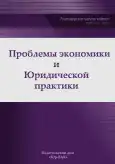Creative Industries and the Digital Economy: Interaction, Research Issues. Publication-Active Creative Industries (Russian Practice)
- Authors: Gumerova G.I.1, Butneva A.Y.2, Shaimieva E.S.3, Litvin I.Y.1, Trifonova N.N.1
-
Affiliations:
- Financial University under the Government of the Russian Federation
- Bocconi University, Milan Polytechnic University
- Kazan Innovation University named after V.G. Timiryasov (IEUP)
- Issue: Vol 18, No 4 (2022)
- Pages: 238-243
- Section: Articles
- URL: https://journal-vniispk.ru/2541-8025/article/view/147242
- ID: 147242
Cite item
Abstract
Full Text
##article.viewOnOriginalSite##About the authors
Guzel I. Gumerova
Financial University under the Government of the Russian Federation
Email: gigumerova@fa.ru
Dr. Sci. (Econ.), Professor; Professor of the Department of Management and Innovation Moscow, Russian Federation
Alexandra Yu. Butneva
Bocconi University, Milan Polytechnic University
Email: aleksandra.butneva@studbocconi.it
Master's degree student Milan, Italy
Elmira Sh. Shaimieva
Kazan Innovation University named after V.G. Timiryasov (IEUP)
Email: shaimieva@ieml.ru
Dr. Sci. (Econ.), Associate Professor; Professor of the Department of Management, Head of the Research Laboratory of Knowledge Management of the Faculty of Management and Engineering Business Kazan, Russian Federation
Irina Yu. Litvin
Financial University under the Government of the Russian Federation
Email: liylitvin@fa.ru
Associate Professor; Associate Professor of the Department of Management and Innovation Moscow, Russian Federation
Natalia N. Trifonova
Financial University under the Government of the Russian Federation
Email: nntrifonova@fa.ru
Cand. Sci. (Econ.), Associate Professor, Assistant of the Department of Management and Innovation Moscow, Russian Federation
References
- Altukhov A.I., Dudin M.N., Anishchenko A.N. Optimization of energy consumption at agricultural enterprises using Smart Manufacturing technologies (industrial Internet of Things) // Problems of the market economy. 2019. No. 1. pp. 58-66.
- Angelova O.Yu., Podolskaya T.O., Chepyuk O.R. Digital creative industry: on the way to the economy of «emotions» // Bulletin of Nizhny Novgorod University named after N.I. Lobachevsky. Series: Social Sciences. 2019. No. 2 (54). pp. 38-43.
- Busygin E., Volkov G. Intellectual property in the financial and economic activity of the enterprise // Intellectual property. Industrial property. 2014. No. 7. pp. 32-38.
- Zozulya D.M. Digitalization of the Russian economy and Industry 4.0: challenges and prospects // Issues of innovative economy. 2018. Vol. 8. No. 1. pp. 1-14.
- Leshchenko N.P., Reutova I.M. Factors of digital transformation of Russian companies: an industry aspect // Bulletin of the Siberian Institute of Business and Information Technologies. 2020. No. 4 (36). pp. 34-40.
- Pilipenko E.V., Sokolova N.A. Entrepreneurial ecosystems in the digital economy // In the collection: Information Society and Digital Economy: Global Transformations. Materials of the IV National Scientific and Practical Conference Krasnodar. 2019. pp. 163-170.
- Popikov A.A. The influence of the digital economy on market participants: institutional aspects // FES: Finance. Economy. 2020. Vol. 17. No. 7. pp. 57-60.
- Spasskaya L.D. Vector of development of creative industries in the digital economy // Innovative economics and modern management. 2018. No. 4. pp. 10-12.
Supplementary files








